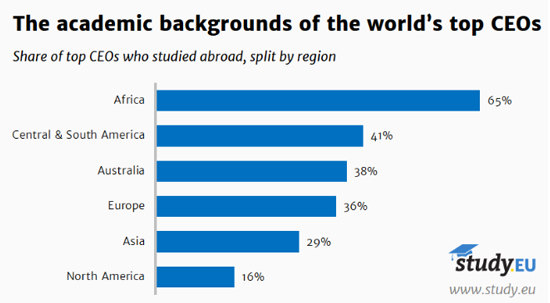The last twenty years have seen a dramatic rise in student mobility. The quest for knowledge and better living experiences, coupled with ease of travel, has led students to explore global education as a viable option. And the numbers prove it.
According to data published by the Organization for Economic Cooperation and Development (OECD), in the year 2000, about 2 million students left their home countries to study abroad. That number rose to 5.3 million in 2017. By the year 2025, it will rise further, to 8 million.
Even with the pandemic affecting close to 3.9 million international students, online courses and virtual classes have kept this trend on the upswing.
The obvious question to ask is – why is this trend on the rise? What are the benefits of studying abroad?
There are many – in fact, we’ve broken them down for you. Here are 10 reasons why you should seriously consider studying abroad.
Table of contents:

We live in an increasingly globalized world today, and studying in another country is the best way to prepare yourself for fitting into such a world.
The enriching, cross-cultural experience of living in another country and learning to communicate with people from diverse backgrounds will not only expand your worldview but will go a long way in transforming you into a global citizen in the true sense of the word.
Did you know that simply picking up another language (which living in another country provides the best opportunity for) can increase your salary? An MIT-based economist Albert Saiz calculated a premium of 2% to 4% increase in the salary of a typical US employee if he/ she was bilingual.
- According to a report published by Forbes, as of May 2021, 13% of the US population speaks Spanish at home. It predicts that by 2050, one in three people in the US will speak Spanish (this includes the bilinguals who will also speak English).
- Employment of interpreters and translators is projected to grow 24 percent from 2020 to 2030, much faster than the average for all occupations. (From the US Bureau of Labour and Statistics)
- In fields such as tourism, hospitality, healthcare, and education, being bilingual or a polyglot gives you a marked advantage.

We’ve got some more good reasons to study abroad. When you consider global education as an option, you open up a world of possibilities.
Your search for further education is then not constrained by the limitations of your country – rather you look for the best options in your area of study around the world. Thus, a global education from an international university enables you to get a high-quality education, as well as provides you access to varied resources and knowledge bases. It also trains your mind to adapt to different academic methods and teaching styles.
And the benefits are tangible. According to research done by study.eu (the European study choice portal) in 2017, 32% of CEOs in companies around the world have had a global education. This metric was arrived at after studying 231 top company leaders from the Forbes Global 2000 company ranking. That’s a significant number and reflects the connection between global education and career trajectory.
Here’s a breakdown by region:

Let’s look at a few top Indian CEOs who have had a global education (we’re not mentioning the very well-known and obvious names like Satya Nadella and Sundar Pichai – who, incidentally, do have a global education)
- Sanjay Mehrotra, CEO, SanDisk Corporation
Studied at – the University of California, Berkeley, and Stanford University.
- Dinesh Paliwal, President & CEO, Harman International
- Pursued an MS in Applied Science and Engineering and MBA in Finance from Miami University
- Sanjay Kumar Jha, former chairman, and CEO, of Motorola Mobility.
Went to the University of Strathclyde and the University of Liverpool
- Arvind Krishna, CEO, IBM
Studied at the University of Illinois
- Indira Nooyi, former CEO PepsiCo
Studied at Yale School of Management
Check out also the cheapest MBA abroad.

As mentioned above, apart from getting a great education, studying abroad also provides a big boost to your career.
Because we live in an increasingly globalized world, an international degree gives you that competitive edge and significantly improves your employability. It’s no secret that many managers today look at an international experience as a great asset. Also, it opens up networking opportunities that can help students get access to the best jobs.
And again, here are some telling statistics that make a direct connection between employability and global education.
A study conducted by Erasmus, which The World Economic Forum quotes in an article on the impact of mobility, reveals that:
- 64% of employers consider international experience as important for recruiting.
- 92% prefer their recruits to have transversal skills (which a global study provides you with)
- 91% said they prioritized knowledge of the field
- More than 90% of the students reported an improvement in their soft skills after studying abroad (which employers pay a lot of heed to) – like the ability to work with people from different cultures, adaptability, foreign language proficiency, and communication skills
These are significant numbers, and definitely reasons enough to consider studying at an international university.
ERASMUS is a European Union student exchange program that allows students to spend anywhere from 3 months to a year at a university in a different country that is part of the Erasmus circuit.

Speaking of networks, let’s consider all the types of people you are going to meet in your years abroad. Student years are some of the best years of your life. And shared experiences lead to the creation of special bonds of friendship with people from around the world.
These life-long friendships go a long way in shaping you and also broaden your global networks and connections.
Here are a few things you can do to network better and also get connected locally.
- Join local Facebook groups
- Get plugged into local networking events
- Go for café meetups for students
You will find that simply taking these few steps will enhance your network and increase your chances of finding the right job after you graduate. Also, make sure you add people to your networks and share your ideas. Don’t be afraid of asking someone for a coffee.
A survey conducted by Lou Adler, CEO, The Adler Group, which works with performance-based hiring has shown that 85% of all jobs are filled through networking – so if you are not meeting people and getting connected, you may be missing out on a career opportunity.

Some people are born leaders, others become one.
Because global universities host students from across the world, they become vibrant cultural hubs where leaders are made. Interacting with students from diverse cultures teaches you valuable lessons on communicating and working as a team – and hones your leadership skills.
Most campuses have student groups, and joining them is always a great idea. Find one which aligns with your interest. For instance, The Wharton School has a group called the Wharton Coding Club, where members meet to stay up to date with the latest trends, target events, and build the right technical skills to get job-ready.

This may sound like a bit of a paradox – because studying abroad comes with a cost, but the truth is you learn the value of money and also explore ways to earn.
Many countries allow students to work while at university, which often enables students to earn enough to pay for their daily needs. Also juggling work and studying teaches you the fine art of balancing and multitasking – skills that come in handy when you start work and have to perform on several fronts. But, do be careful not to overdo the working bit – don’t work at the cost of your grades.
Apart from finding specific opportunities in your area, here are some great side gigs – both online and offline – that you can explore while at grad school:
- Freelance Writing
If you can write, this is the easiest to do. You can do it from your room or dorm, in your time. There are a million sites out there where you can become a contributor or look for gigs. However, these would be a good start:
- Reviewing Apps
As a student you probably already use lots of apps – why not get paid to use them and write short reviews? Look up what platforms are available in your area. Here’s one that many uses:
- Translation Services
If your English (writing and grammar especially) is good and you know another language (which could be your mother tongue) you could consider doing quick translating jobs.
- Tutoring
Depending on your subject expertise, you can offer your services to tutor someone – this could be a junior or a
friend’s friend – tell people that you are open to it to spread the word. You could also look online
- Doing Tasks
One of the best things students are good for is going odd jobs, and there is a great need for getting the right people to go little things that don’t take time but may require someone to get over and do it – it could be anything from picking up someone’s dry cleaning to helping at a party. You could register yourself on such platforms to make yourself available for these tasks.
These gigs apart, you could also offer your services in these areas:
- Walking Dogs
- Babysitting
- Delivering items
But, as we said earlier, you must be careful not to lose sight of the fact that you are there to study, so your work must not get in the way of your studies.

Remember what we told you about the connection between learning another language and getting a higher salary. Well, there’s another big cognitive benefit – learning a second language has been proven to positively impact memory, intelligence, and concentration. So you must jog those linguistic brain cells and either improve your English or learn a new language while at grad school.
And the happy by-product of stimulating the brain is that you will perform better in your studies and hence, get better grades! Who knew that learning a language could have that impact!?

There’s one intangible, but invaluable, a reason to study abroad – to discover yourself.
When you live away from the familiarity of your own surroundings and become independent, you learn things about yourself that you didn’t know before. While you may not realize how this shapes and benefits you, the fact that you become a more self-aware and thinking individual has very positive effects on your overall personality development.
There are a few things you can do to make sure you connect with yourself first:
- Maintain a diary – we tend to forget how we felt after any experience, or even what our goals are – so writing them down will help crystallize your thoughts and become great reference points for you later.
- Take a short trek – something about the mountains helps you reflect on life, and think of things objectively.
Embrace your individuality – sure this sounds a bit clichéd, but there’s truth in it. When you become comfortable in your own self, you become a more positive and confident person. And that helps you become a better student and employee.

Student life does not have to be all work and no play. Living in another country gives you the superb opportunity to travel to different places and meet new people. If, for instance, you are studying in the U.K., you can always travel to other European countries and experience some other cultures as well.
For instance, if you are studying in the UK, it’s an excellent opportunity to travel to parts of Europe. Here are our top five recommendations for travel in Europe during your summer break
- Rome
- Prague
- Paris
- Budapest
- Barcelona

Last but not the least, living in another country gives you the opportunity to pick up a new interest – like a sport – that you may not have a chance to explore in your home country.
Many students get into water sports, hiking, or learn sports like skiing or golf when they study abroad. Imagine the money you’ll save if you learn to surf while living near the water (if your university is on a coast that is).
It’s all worth it and the benefits of studying abroad are almost countless.
That’s been a lot to digest we know. But these are all extremely valid reasons to think about getting a global education! You will not only get a high-quality education and better your job prospects, but living and studying abroad will make you into the leader you are meant to be and give you the gift of friendships across the world. It will definitely set you apart from the rest, and that road is sure to lead you to the job of your dreams.
So go for it – you have nothing to lose but your inhibitions! Check out how much does study abroad cost now!
























